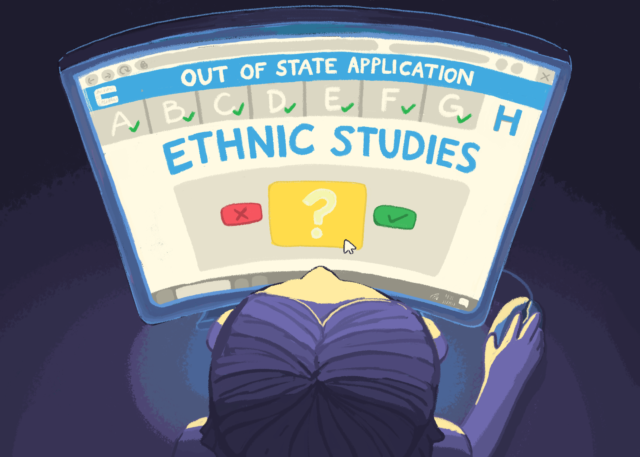This post was updated Nov. 27 at 8:29 p.m.
I know firsthand what it feels like to have my culture and history tacked on to the end of a social studies unit.
My Asian American heritage – along with African American, Latinx and Indigenous backgrounds – still remains undervalued and grossly underrepresented in education. These histories are misrepresented at best and actively banned at worst.
At UCLA, we’re fortunate to be a part of an institution that continues to progress toward a more diverse student body, but it’s not immediately apparent why we need to continue our shared journey of inclusivity. It’s crucial for all students to feel represented in and out of the classroom and to have the opportunity to learn more about each other in the process.
In October 2021, Gov. Gavin Newsom signed a bill requiring California high school students to satisfy an ethnic studies requirement before graduation. The policy is set to go into effect in 2029, with schools required to offer ethnic studies courses by 2025.
According to an emailed statement from the University of California Office of the President, the UC Board of Admissions and Relations with Schools is developing a policy proposal to include an ethnic studies requirement in the University’s A-G requirements for first-year admissions – which currently include math, fine arts, English and other core subjects.
The attempts to amend the A-G admissions requirements began in October 2020, largely because of the Black Lives Matter movement and other protests against racial injustice during the summer. BOARS approved an initial draft in November 2021, which has since undergone months of systemwide feedback and rewriting.
In May, a letter titled “Statement in Support of the UC A-G Ethnic Studies Requirement” was circulated among the UC campuses, garnering more than 1,300 individual signatories including students, faculty and alumni.
In response, a letter addressed to the board was also circulated by some UC faculty. It sharply criticized the proposal because of the “intensely political nature of the ethnic studies debate,” urging the UC Academic Senate – which has the authority to oversee academic policy and conditions for admissions – to abandon the proposal in its entirety.
While some criticism of the ethnic studies proposal may be warranted, it should not be abandoned completely. Not only would ethnic studies help us overcome implicit biases in our sociocultural lives, it would also force us to critically assess racism, classism and sexism in academia.
After all, we’ve been learning everything from history to philosophy from an overwhelmingly Eurocentric and male-dominated perspective our whole lives. A flip of script is long overdue.
It is vital, particularly in a world rampant with structures of oppression, for students to be able to bridge cultural gaps and connect with each other, said Karen Umemoto, director of UCLA’s Asian American Studies Center and a professor of Asian American studies and urban planning.
“Ethnic studies was built … to give voice to those most marginalized within our communities,” Umemoto said.
The UC has no excuse to not implement this requirement.
However, concerns about the proposal need to be taken very seriously.
For starters, collective action across the UC schools has proven difficult. UCLA expressed concerns for first-year out-of-state students, international students and transfer students, who may not have had the opportunity to take ethnic studies courses in high school.
“High school back home definitely didn’t prepare me for it because none of my grades or transcripts from high school actually applied,” said fourth-year psychology transfer student Eline Budi. “In my Indonesian school system, we didn’t get to choose (classes).”
Budi added that the ethnic studies proposal would’ve presented a challenge to her right out of high school, and she might have been able to satisfy it only after completing two years of community college.
On top of that, out-of-state students may also struggle with fulfilling an ethnic studies admissions requirement. In Iowa, a bill was passed to limit the teaching of critical race and gender studies in public school classrooms. Texas also banned the discussion of contentious issues such as public policy or social affairs.
All of these efforts to severely limit the open discussion of race, gender and ethnicity prevent many students from critically engaging with their peers over these issues.
Therefore, dissenters of the proposal argue it is unfair to punish prospective out-of-state students who have no feasible options, since it is no fault of the individual student that schools across the country have banned discussions of ethnic studies.
UCLA advised an amendment to the proposal in 2022 that would allow students to take an ethnic studies course in their first year to satisfy the H requirement.
“I think it’s better for them to get that type of instruction at institutions that are good at it and that have a track record and have qualified faculty to teach it,” Umemoto said.
She added that this leniency should only be granted for a few years to put pressure on high schools across the country to begin offering ethnic studies courses.
It is clear the proposal still has some concerns to address. Whether it’s by allowing first-year college students to take UC courses to satisfy the ethnic studies requirement or the Academic Senate being more lenient with the high school courses that satisfy the requirement, BOARS must broaden and emphasize the scope of ethnic studies while keeping the field accessible to all.
The ethnic studies requirement, should it be implemented, must not be viewed as the end-all, be-all of our journey toward a more inclusive society. However, it does say a lot about how the UCs want to represent themselves.
If UCLA wants to earn its reputation as an inclusive institution, we have to work for it at every level of academia. From our admissions to our curriculum, we need to lead by example.



Comments are closed.